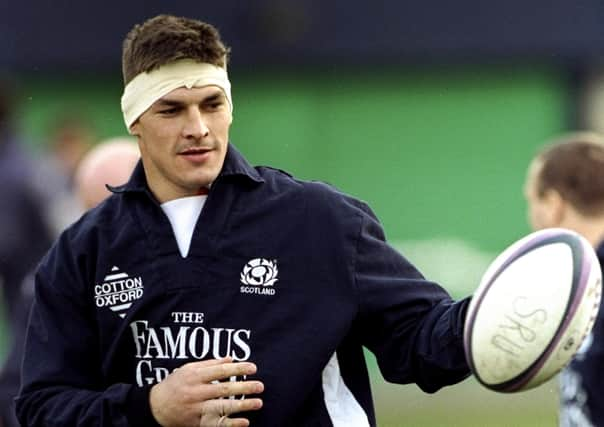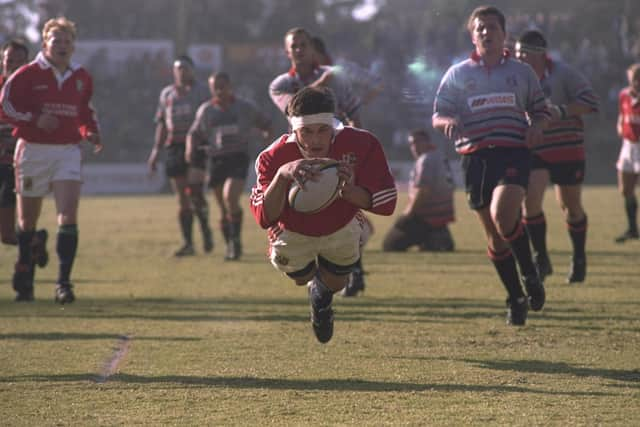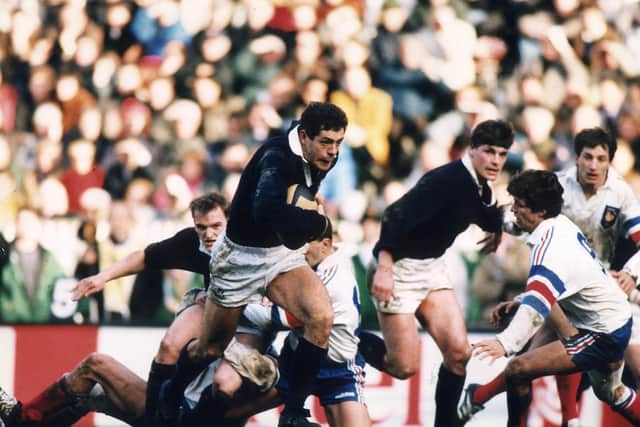Interview: Rob Wainwright on going from rugby hero to a Coll farmer, and toasting classic wins over France with bottles of Dom Perignon


It’s gone six o’clock, Rob Wainwright having requested we talk at tea-time as he’d hoped the forecast of bright sunshine would come to pass, enabling him to catch up on jobs beaten by the most drookit February on record. Tired but happy, he’s sipping tea on one of those God-given days that remind him what a jolly good idea it was to move his family here 21 years ago.
“It’s been an amazing day, the kind where every sound has been just so incredibly loud,” he says. “We’re 500 yards from the sea and often over the past few weeks because it’s been so windy the roar from it has been incredible. But right now, looking out over this wee voe, I can hear tiny little waves lapping the beach. I let off a goose-rocket this afternoon – we have five different types of geese here and while some are protected, the feral ones loiter on grass I’d like to be saving for hungry mouths as lambing approaches so I try to scare them off – and there was such a boom that everyone and everything got a fright. The chickens went ballistic.”
Advertisement
Hide AdAdvertisement
Hide AdWainwright was the Army doctor who became our first captain of the pro era. He was a victorious Lion in South Africa, 1997. A titan of the Scotland back row, he won 38 caps and got close to a Grand Slam twice, being denied by the rump of an England pack which wouldn’t have looked out of place at the Royal Highland Show. Against France – tomorrow’s opponents for his old team-mate Gregor Townsend’s XV at Murrayfield – he played in tremendous victories and tragic defeats. We’ll come to rugby shortly but let’s probe further the reasons for his sunny disposition because they’re not all down to the weather.


Our man, it turns out, is Coll’s Harvey Goldsmith. Okay, so the concert he’s helped bring about involves a trio of veteran Scottish folkies rather than the just-revealed Genesis comeback, but Barbara Dickson, Ally Bain and Phil Cunningham amount to a big deal for the island. “I’m a pal of them all and we’d been talking for a while about a gig. In the case of Ally, we’d been talking for eight or nine years about us going trout fishing together so we’ll hopefully fit that in, too. The show will be in our splendid community centre and help pay for its upkeep, the new kids’ playpark, things like that, so if you could publicise it, that would be great – 10 June at An Cridhe.”
Another reason for his good mood is that Coll is in the midst of a population explosion. Okay, it’s all relative, but a little girl, name of Orla Ishbel, born earlier this week makes it four babies in the last 15 months. “When we came to the island there were 160 inhabitants,” he explains. “That spiked to 240 but then dropped to 200. There had been a hiatus for about six years, no new babies born, but Orla and the others are the lifeblood of our community.”
Then he laughs. Maybe when he’s not being Harvey Goldsmith he’s Coll’s Dr Spock. “I used to josh with the young women of the island and tell them they needed to reproduce. It was all a bit of a laugh but I’ve been told I can’t do that anymore!”
There’s a serious side to this: Coll’s falling demographic has prompted comparison with the demise of St Kilda. In a newspaper article marking the 20th anniversary of his and wife Romayne’s move to the island with their four children, Wainwright, now 54, spoke from the heart about the joys of island life but also the grumps, including the ferry’s unreliability, the road tariff, the steeper fuel prices, the lack of housing, the shortage of jobs and the limited opportunities for young people. A combination of these, he says, most probably influenced the decision of some to give up on the island.


The Wainwrights, though, won’t be doing that. “We feel part of a community here and that’s a rare thing these days and something to be treasured,” he says. “Imagine me from my background – Glenalmond [School], Cambridge [University], the Army, rugby – enjoying bingo as much as I do! We’re much more socially connected than if we’d remained on the mainland. The thing TV reality shows and travelogues always get wrong about island life is the idea that people come for the peace and the solitude. Folk assumed we wanted to hide away when we moved here; that wasn’t the intention at all. I’ve always joked that Coll is a very private place, just as long as you don’t mind everyone here knowing exactly what you’re doing at any given moment. Occasionally I’ve tested the bush telegraph: spread a wee lie and timed how long it took to come back to me. We may deny it but everyone loves a gossip. The good news about baby Orla, though, has travelled fast and the whole island is thrilled.”
Wainwright confesses to a “reputation for indiscretion” but the story of how he and Romayne got together is a good one and indeed sounds like a Richard Curtis movie storyline. They met at Wainwright’s 16th birthday party when he was rooming with her cousin at Glenalmond, but didn’t last long as teenage sweethearts. Fast-forward to a wedding many years later when, both going out with other people, they met again. Could they make another go of it? A few months further on they did and the rest is history.
It can be difficult to get Wainwright to stop being amused by the quirks of Hebridean life and I suggest he makes Coll sounds very Whisky Galore-ish. “It can be exactly like that. A while back we had a whalebone wash up on one of the beaches. The National Museum arrived to collect it and found there were a few pieces missing. Some islanders had sawn off bits of the jaw so that part of the big beastie remained here. A newspaper came to our rescue, arranged for fibreglass casts, and these now sit on the hill above the pier.”
Advertisement
Hide AdAdvertisement
Hide AdAnother reason for Wainwright’s upbeat mood is the mobile phone in his hand and this leads us back to rugby. Six years ago, Coll was split over plans to make mobiles work on the island. Those violently opposed feared tranquil Hebridean life would be ruined; Wainwright didn’t go that far but was against the erection of a phone mast. 4G duly arrived and while a neighbour was soon extolling the benefits of the computer in his hand, Wainwright stuck with his trusty, calls-only Nokia. But then he joined the revolution and, really, hasn’t looked back. “WhatsApp keeps me in touch with my old rugby mates. Just before taking your call I was following the progress of some Lions at a benefit night for [cancer-stricken] Tom Smith in London. I don’t post photos of my dinner or anything but I’m probably a social media addict now.”
South Africa came near the end of an illustrious career. It began in 1992 with Wainwright’s first start for Scotland at home against France, a game won although the newbie confesses he remembers little about it. “Of course the walk down the tunnel on to a full Murrayfield is one of life’s great excitements,” he says, “but the match passed me by. The pace of it was so much faster than anything I’d experienced before. I think I managed to do my basic duties sufficiently but, really, I ran around after the game and didn’t ever catch up.”
He says he doesn’t miss rugby. Not the training or “eating like a pig” to stay two stones above normal weight, that’s for sure. I bet he doesn’t miss seeing stars after being slugged by England’s Jason Leonard. He laughs at the memory of the punch from the England prop as Scotland strove for the 1996 Grand Slam at Murrayfield, although it wasn’t funny at the time. Did his assailant – absurdly unpunished – say anything to him afterwards, maybe: “Sorry, old boy, but I had to do it”?
“Yes, it was discussed. Jason has a funny story about his citing; he’s told it in front of me a couple of times. The video evidence wasn’t absolute but the committee gave him a nod and wink: ‘This obviously happened. Watch your step.’ It had a major impact on the game. A lot of the decision-making was centred on me as captain and the blow just emptied my head. But I suppose I could be flattered that I was deemed take-outable!” Then Wainwright says something which separates the men from the boys, separates guys who ventured into in the scrum in those Wild West days from wimps like you and me who’d run a mile from such a grunting, steaming mass of valour with occasional outbursts of licensed thuggery: “Jason’s a wonderful guy, you know.”
The pair were Lions together and that tops everything, renders such kerfuffles inconsequential. And the question of whether he may pine for his playing days is also inconsequential. “Your career comes to an end and that’s that. Elements of rugby are a little foreign to me now. I’m in awe of the skill of the guys in the game these days but worried about this arms race over player size. But when I stopped we came to Coll and I moved on to new challenges.” He can say that again. Just the other day, leaked Government emails had a senior Treasury advisor suggest that Britain no longer needed farmers as the food sector was “not critically important to the economy. “Yes I saw that,” says Wainwright. “He’s one of Dominic Cummings’ whackos, presumably.” And farmer Rob is still suffering the blows, having come off worst in a feeding-time confrontation earlier today. “Our breeding cattle are Luing: hardy, productive but terribly impatient. When I turned up with the bag of feed one of them knocked me clean off my feet.”
Wainwright’s Scotland were never able to beat Leonard’s England. Wainwright did manage a try against them but the Auld Enemy, recognising the Dark Blue threat, would send out a call for the indomitable Dean Richards to return to the fray. “They were our bogey side. A significant proportion of our team – ideally everyone – had to step on to the park thinking we could win and that wasn’t quite the case.”
France with their laissez-faire style (what’s French for laissez-faire, by the way?) would show Scotland a door slightly ajar and sometimes we were able to barge right through. There was a heartbreaking defeat in Pretoria in the 1995 World Cup: “We were brilliant in the first half then fatally sat back. Injury time was unusually long and France won thanks to the name of the moment [Emile] Ntamack [father of current France playmaker Romain].” But the following year at Murrayfield Scotland out-flaired Les Bleus for a famous win.
“That day we were harum-scarum, unpredictable, full of surprises. What I think Scottish rugby should be, what I like about the present team when they throw the ball around.” Wainwright’s last two games against France saw their opponents remember who they were and in 1997 score 49 points against us then 51 the following season. But, haven’t we missed Paris ’95 and the Toony flip? No, we were saving the best for last.
Advertisement
Hide AdAdvertisement
Hide Ad“That was a wonderful match and a wonderful celebration. In my career I didn’t play for clubs or districts who won a huge number of trophies so to achieve victory there for the first time in 26 years was fantastic and the party was the best ever.”
The Toony flip of course was Townsend’s little popped-up pass to Gavin Hastings for the killer try. “I had an excellent view of it, being right behind Gavin,” adds Wainwright. “Flankers in those days tended to run everywhere, literally following the ball. We didn’t do a lot of sprinting but we could loup all day long. Luckily the pass went to Gavin and nowhere near me because I would never have been able to burst through that hole.”
Then it was all back to the Ambassador Hotel from where Wainwright reckons an entire sector of the rugby dinner circuit has been able to draw its material. “We got stuck into the Dom Perignon ’86 and charged it all to the SRU room manager. The bill was £7,500 and truly that was the last hurrah of the amateur era.
“Four years later I was back in Paris as a supporter for an even better Scottish win [en route to us winning the championship] so it seemed only right that I drink Dom Perignon ’86 in the Ambassador again. On the plane home I asked our room manager’s successor what his bill had been, having already told him about the seven-and-a-half thousand quid. ‘Nothing like that this time,’ he said, ‘although some bastard sneaked a £200 bottle of champagne on to it’!”
Comments
Want to join the conversation? Please or to comment on this article.
